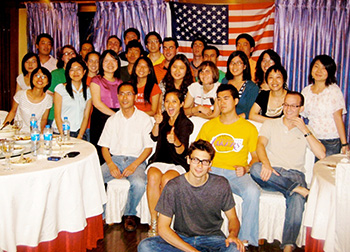Cover Story Sidebar
A major emergence: China program as path to professional success

Max Klein '08. See larger image
I have lived and worked in Beijing since 2008. Cornell's China and Asia-Pacific Studies (CAPS) program, established in 2005 as the brainchild of Michael Zak '75 and a group of visionary professors and administrators, helped me fulfill what had become my undergraduate academic goals of learning about China and studying Mandarin. CAPS also arranged internships and study opportunities in Beijing so that I could be on the ground and experience China firsthand.
As a practical, multidisciplinary China studies program, CAPS combines on-campus courses in government, international relations, economics, business and history with two off-campus semesters. In the semester in Washington, D.C., students might hold internships at companies, government agencies, or think tanks to learn about how experts deal with U.S-China affairs. In the semester in Beijing, CAPS students study at Peking University, one of China's most prestigious universities.
Unless you're blessed with native language skills, studying Mandarin is one of CAPS students' sources of pride and dread. Newly initiated students received a "Chinese name" in Professor Stephanie Divo's introductory Chinese class and it sticks with you as long as you remain a student of Chinese. The names might loosely reflect your English name's pronunciation, or not. It's entirely possible to have no idea what your classmates' "real" names are for an entire semester, and it's awkward to greet them on the Hill with a name you may very well mispronounce. In my case, I am Ke Mude, and Ke Mude is me. I really have to hand it to our teachers – Teng Laoshi, Su Laoshi, Yang Laoshi and Chen Laoshi to name a few – who crammed proper-sounding Mandarin names and phrases into our brains despite our mostly sophomoric in-class behavior.

Alumni and Cornell students gather in Beijing, China, in 2010 during the CAPS program. See larger image
Because four of my CAPS classmates decided to move to China after graduation, my decision to do so was made a lot easier. Sitting on the front lines of U.S-China relations would not have been possible without the foundation that CAPS – and the teachers, administrators and alumni involved with the program – provided to me and my classmates. During my interactions with Mike Zak over the past 10 years, he has reaffirmed his hope that CAPS graduates will become U.S-China relations leaders and that the two countries can, to the greatest extent possible, avoid misunderstandings that impede addressing critical global issues.
I hope CAPS will continue to enhance and hone its curriculum and structure to reflect China's ongoing change and global significance, and that more CAPS graduates will find a path to China after graduation or to spend extended time there at some other point in the future. Hou nian da ji! (Happy New Year of the Monkey, the Chinese zodiac sign for 2016.)
Klein has lived in Beijing since his graduation from Cornell in 2008 and is a senior product manager at Amazon. He previously worked in corporate strategy at Intel, and in U.S-China trade policy at a trade association. Klein also serves as a CAPS alumni adviser and helped rekindle the Cornell Club of Beijing with fellow CAPS students and Beijing-based Cornell alumni.